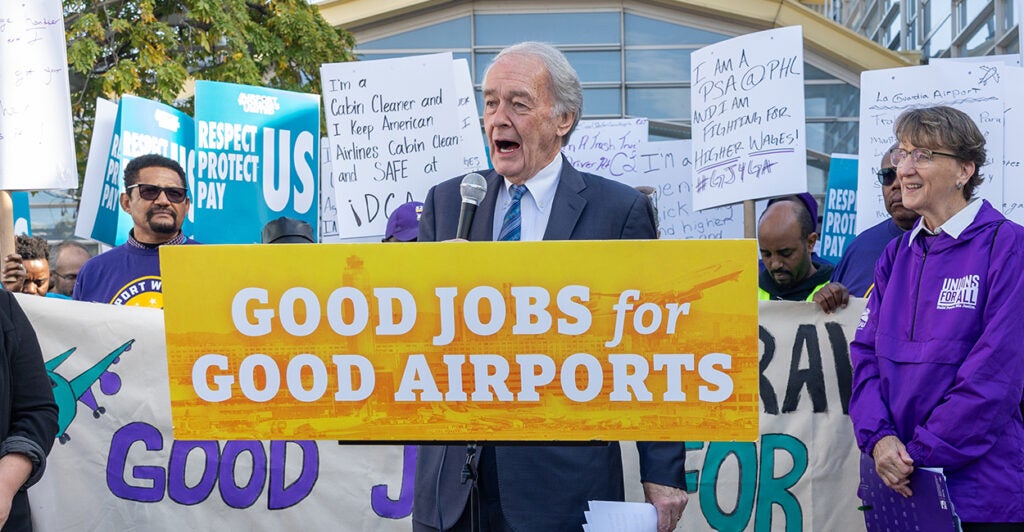Airline prices—which are already 22% higher than they were two years ago—could get a whole lot more expensive and many airport workers could lose their jobs if a proposed amendment allowing the federal government to set the wages and benefits of airport workers makes its way into a Federal Aviation Administration bill.
That proposal from Sen. Ed Markey, D-Mass., is straight out of a command economy. It wouldn’t just put the government in charge of the wages and benefits of Transportation Security Administration employees—it would include the ticket counter workers, luggage loaders, janitors, restaurant and retail store workers, and virtually every worker with a connection to the airport, even though they are employed by private companies.
It even extends to workers at off-site catering services from which the food is delivered “to a location on or near airport property,” according to the language of the amendment.
The problem with the federal government setting wage and benefit rates is that it knows nothing about running an airline or a luggage transportation operation or a restaurant, hotel, or catering service. And when it sets a price that is too high or too low, that can cause surpluses or shortages.
The government dictates on wages and benefits under the “Good Jobs for Good Airports” amendment will almost certainly be well above the market rate, especially after mandated fringe benefits are included. That will lead to higher prices and lost jobs.
When private employers have to pay people more to do the exact same thing, they have to raise their prices. That reality was clear when the government gave out $600 weekly unemployment insurance bonuses in response to the COVID-19 pandemic. With unemployment paying more than work for many people, employers that remained open had trouble keeping their current staff, and other employers that shut down had trouble getting workers to come back once they reopened. Because employers had to pay workers more than before, they had to raise their prices to pay for it.
But there’s a limit to how much businesses can raise prices before people start buying less of what they’re selling. If a $350 flight and some airport food becomes $425, that could deter many people from flying, which could spill over to a decline in overall tourism.
And when prices rise beyond what some current customers are willing to pay, business slows and employers have to eliminate jobs, try to replace workers with automation, or even shut down.
That’s what’s happening now in California, where the state government decided to empower a local board with the authority to dictate wages for restaurant workers. Over 1,200 Pizza Hut delivery drivers are among many workers who have and will lose their jobs as a result of the government deciding it needed to intervene to “help” workers have “good jobs.”
Higher wages are a great thing if they come as a result of workers becoming more productive and consumers desiring their products. But higher wages that come from government command instead of market demand can end up hurting the people they aim to help and lead to all sorts of unintended consequences.
There are better ways to help workers achieve higher incomes, such as by expanding alternative forms of education and job training, reducing unnecessary regulations so that businesses can invest more in workers, and opening doors to entrepreneurial opportunities for lower-income workers by reforming occupational licensing laws that create barriers to entering a career field and allowing all types of workers the freedom to contract.
The federal government has no business setting wages and benefits for anyone other than its own employees. Lawmakers should not exploit a Federal Aviation Administration funding bill to try to become airport wage-and-benefit controllers.
Have an opinion about this article? To sound off, please email letters@DailySignal.com, and we’ll consider publishing your edited remarks in our regular “We Hear You” feature. Remember to include the URL or headline of the article plus your name and town and/or state.
